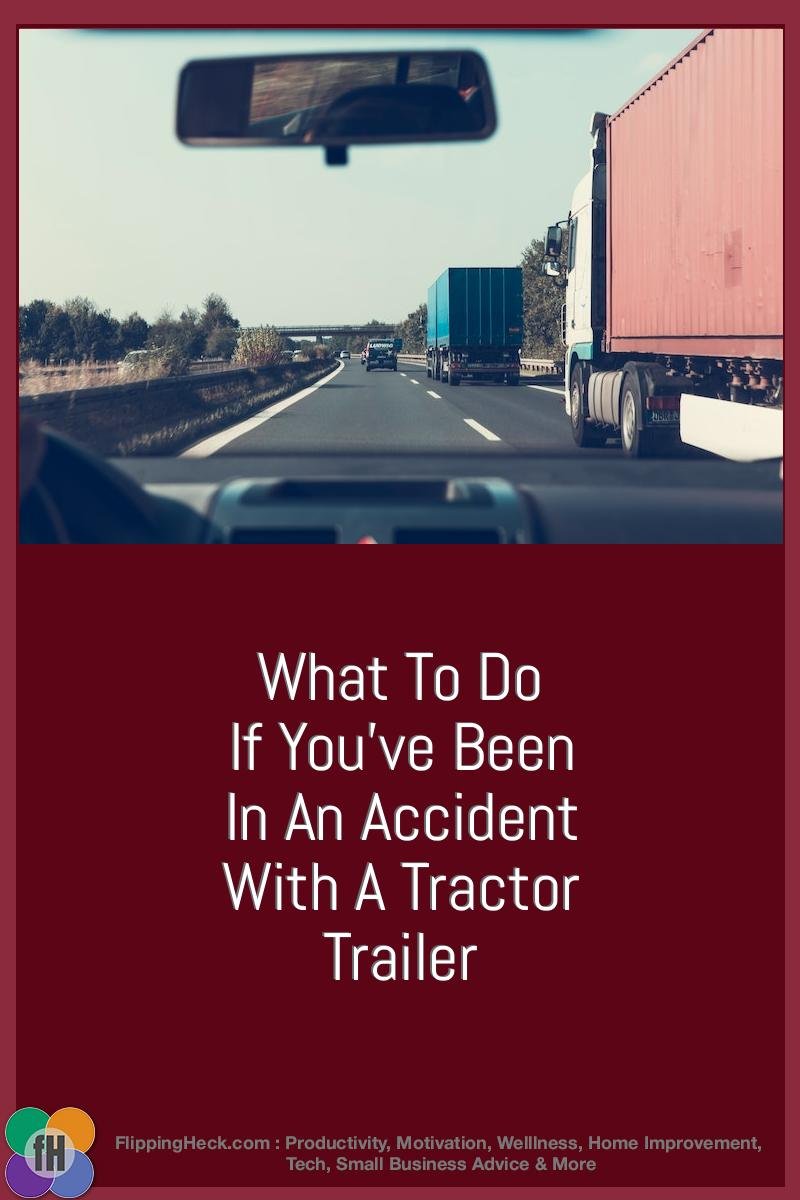What To Do If You’ve Been In An Accident With A Tractor Trailer
Road accidents can be distressing and chaotic, especially involving massive vehicles like tractor-trailers. These commercial trucks’ sheer size and weight can lead to severe damage and life-altering consequences. If you are in such an unfortunate situation, knowing what steps to take to ensure your safety, protect your rights, and facilitate the claims process is crucial. This article guides you through a comprehensive plan of action to follow if you’ve been in an accident with a tractor-trailer.

Road accidents can be distressing and chaotic, especially involving massive vehicles like tractor-trailers. These commercial trucks’ sheer size and weight can lead to severe damage and life-altering consequences. If you are in such an unfortunate situation, knowing what steps to take to ensure your safety, protect your rights, and facilitate the claims process is crucial. This article guides you through a comprehensive plan of action to follow if you’ve been in an accident with a tractor-trailer.
1. Prioritize Safety and Seek Medical Attention
The aftermath of a tractor-trailer accident can be bewildering, but your safety should be the immediate concern. Check yourself and others for injuries and, if necessary, call for medical help. While waiting for assistance, move to a safe location to prevent further accidents. Even seemingly minor injuries could have delayed effects, so it’s always best to seek medical evaluation.
2. Gather Information
Exchange information with the truck driver and any witnesses present. Collect their names, contact details, and statements about the accident. Also, take photographs of the accident scene, vehicle damage, road conditions, and any relevant road signs. This documentation will serve as valuable evidence when reconstructing the accident later. Detailed images of the damage can reveal information about the force and angle of the hit.
3. Contact Your Insurance Company
Reach out to your insurance company as soon as possible to report the accident. Provide them with accurate and detailed information about the incident. Avoid making assumptions or guesses about the circumstances; stick to the facts you know. Your insurer will guide you through the claims process, which might involve providing additional information, obtaining repair estimates, and potentially arranging a vehicle inspection.
4. Commercial Trucking Insurance
Commercial trucking insurance plays a pivotal role in such accidents which can easily be obtained by trucking companies from reliable sources. This specialized insurance coverage differs from regular auto insurance due to the unique risks associated with commercial vehicles. It’s designed to cover not only vehicle damage but also bodily injuries and potential liabilities arising from the accident.
Understanding the complexities of this insurance can help you better navigate the claims process and ensure both parties receive appropriate compensation for their losses.
5. Avoid Speaking About Fault
At this moment, it’s natural to feel compelled to apologize or take responsibility, even if the accident wasn’t your fault. However, refrain from admitting fault or making statements that could be interpreted.
Fault determination is a complex process that involves investigation and evidence, and premature admissions can harm your claim later. Sticking to factual statements and leaving fault determination to the experts is advisable.
6. Consult Legal Counsel
Depending on the accident’s severity, consulting an attorney might be beneficial. A legal expert can help you navigate complex legal procedures, negotiate with insurance companies, and protect your rights.
Remember that some personal injury attorneys work on a contingency basis, meaning they only get paid if you win your case. Legal counsel can provide invaluable guidance when dealing with complex legal and insurance matters.
7. Document Medical Treatment and Expenses
If you sustained injuries in the accident, keep detailed records of your medical treatment, prescriptions, and related expenses. This documentation will be crucial for establishing the extent of your injuries and calculating compensation for medical costs, pain, and suffering.
It’s important to note that some injuries might not show immediate symptoms, so keeping track of your medical journey can provide a comprehensive picture of your physical and emotional recovery.
Insurance adjusters can contact you after the accident to gather investigation information. While it’s essential to cooperate, be cautious when discussing the accident with them.
Their primary goal is to minimize the insurance company’s liability, so it’s advisable not to provide recorded statements without consulting your attorney. Remember that you have the right to have your legal counsel present during any conversations with insurance representatives.
9. Keep Records of Communication
Throughout the claims process, maintain a thorough record of all communications related to the accident. This includes emails, letters, phone conversations, and notes from meetings.
Organizing your records will help you stay informed and maintain a clear overview of the progress. It can also serve as evidence of your proactive approach to resolving the matter, which can influence how insurers and potential legal proceedings perceive your case.
Conclusion
Being involved in an accident with a tractor-trailer can be overwhelming, but knowing how to respond can alleviate some of the stress. Prioritize safety, gather information, and communicate effectively with law enforcement, witnesses, insurance companies, and, potentially, legal counsel.
By following these steps diligently, you can protect your rights, ensure your well-being, and navigate the aftermath of a tractor-trailer accident with greater confidence.

